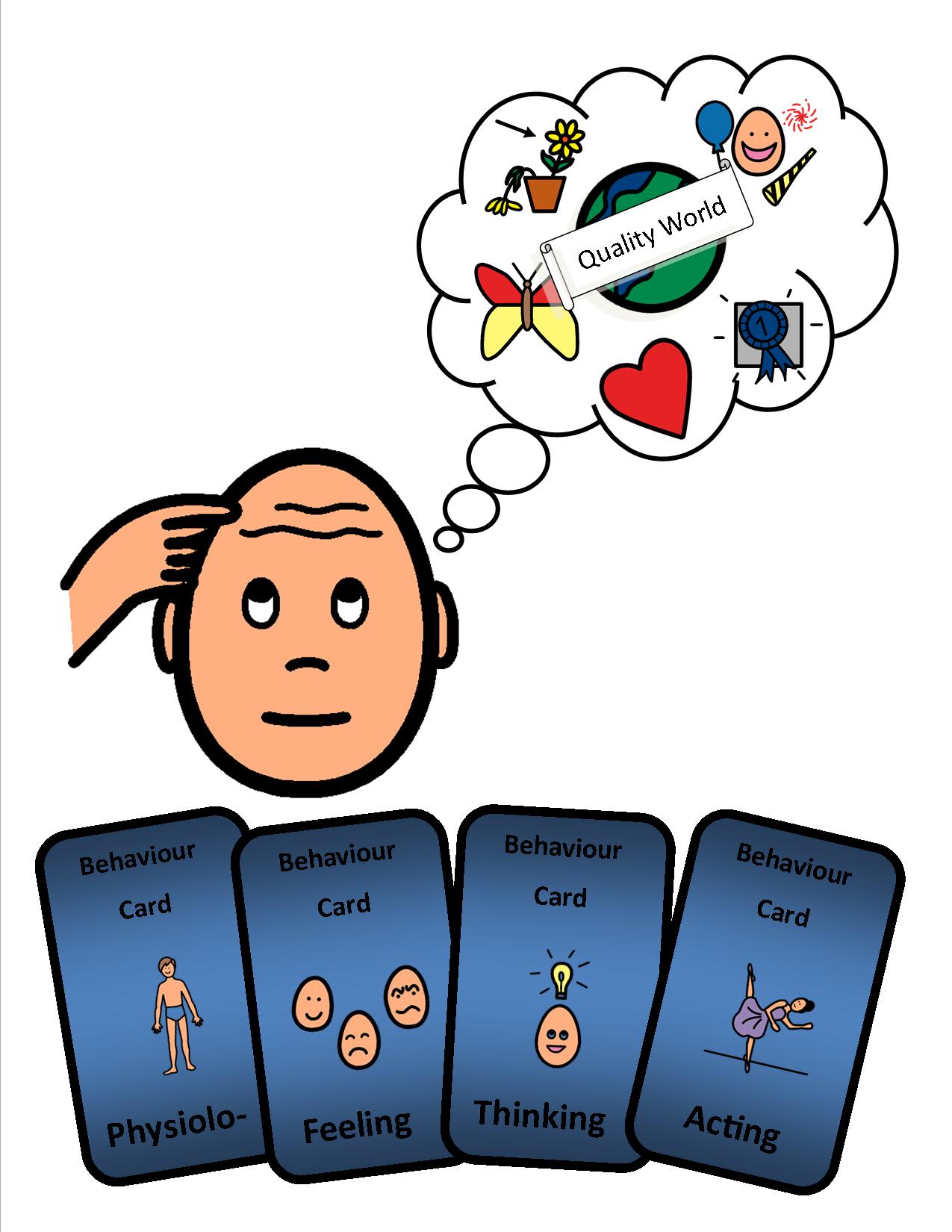Choice Theory
Choice Theory is the life work of William Glasser, MD and is based on more than fifty years of theory and practice as a counselor.
Central to the theory is each person’s unique “Quality World”. It represents our outlook and understanding of the world. In many ways it is a our ideal world; the place where our representations of quality and value are held. It holds the “pictures” we have of the best ways to satisfy our needs. As a person grows, these representations change: we add to them, remodel them, and sometimes eliminate them. This activity relies on our ability to compare perceptions of our real world against the perspectives we hold in our Quality World.
According to Choice Theory, humans have five needs and, while these needs are present in all humans, their relative degree of importance and their level of expression, is unique to each individual.
 Love & Belonging: belonging, being loved, being respected, friendship, caring, cooperation
Love & Belonging: belonging, being loved, being respected, friendship, caring, cooperation
 Freedom: choices, independence, freedom from, freedom to
Freedom: choices, independence, freedom from, freedom to
 Fun: enjoyment, laughter, learning, change
Fun: enjoyment, laughter, learning, change
 Power: recognition, success, importance, achievement, competence
Power: recognition, success, importance, achievement, competence
 Survival: health, safety, sexual activity, food, clothing
Survival: health, safety, sexual activity, food, clothing
As humans, our needs drive our behaviour. We behave in ways to make our real world and quality world congruent. We behave to fulfill our needs and to achieve real world experiences in ways that are consistent with our Quality World.
Behavior is made up of four parts: acting, thinking, feeling and physiology. These components are related and interactive.
Unhappiness and dissatisfaction occur when the behavioural choices we make do not close the gap between our real world perceptions and the ideals of our quality world.
Happiness and satisfaction occur when our needs are met and our real world perceptions and quality world are congruent.
Simple enough? Sure – except that consistent, cognizant, thoughtful behaviour can be difficult. The ability to make immediate and conscious choices about our feelings and physiology is rare. We can more easily make choices about how we act and feel which can, in turn, affect our feelings and physiology. Reflection is required to understand how well we are meeting our needs at any given time. Sometimes humans resort to pretty creative behaviour to meet their needs and to change a desperate situation. Sometimes these chosen behaviours are so extreme they are labeled “mental illness”. Sometimes intervention is required. Reality Therapy is the Choice Theory-based counseling process focused on helping people learn to make better choices: choices that will satisfy their needs in ways that lead to greater satisfaction and happiness.
Choice Theory and Educational Technology
Basically… Glasser believes that teachers and school are responsible for creating learning environments that meet the needs of students. Love & Belonging, Freedom, Power, and Fun are critical to the design of all learning environments. In Choice Theory terms, Fun and Learning are synonymous.
In the video: Reality Therapy Overview with Bob Hoglund, provides more insight into Choice Theory and Reality Therapy. Pay attention to the latter half of the video. Hoglund presents four powerful questions for reflecting upon education and technology.
Discussion Questions:
Some questions about educational technology from a Choice Theory perspective might include:
1. How can technology make schools and classrooms more need-fulfilling for students and teachers?
2. How can technology promote the ability of students and teachers to meet their needs in ways that lead to greater satisfaction and happiness ?
3. How can technology impede the ability of students and teachers to meet their needs in ways that lead to greater satisfaction and happiness ?
4. How does interacting with technology affect our Quality World? Does it narrow or widen the gap between our real life perceptions and our Quality World perspective?
References
Choice theory. In Wikipedia. Retrieved from http://en.wikipedia.org/wiki/Choice_theory
Russell, B. Uncork your mind. Retrieved from http://brentonrussell.com/2010/12/20/design-your-lifestyle-for-happiness-and-fulfillment/
Hoglund, B. (2008, September) Reality therapy overview (Video File). Retrieved October 15, 2012 from https://www.youtube.com/watch?v=mZWGzWPqja0&feature=related
Continue to Addiction, Dependence, or Abuse Guide Page


